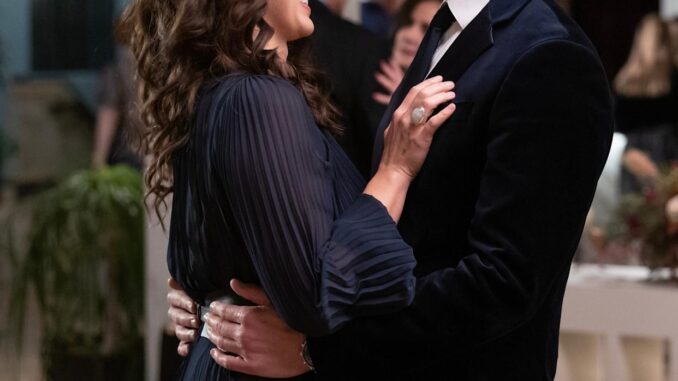
The Collective Sigh and Mekia Cox’s Giddy Admission: When Even the Creators Become Fans
In the vibrant, often chaotic world of television, certain on-screen romances transcend mere plot points to become cultural touchstones, drawing viewers into a collective, breathless anticipation. For fans of ABC’s The Rookie, few dynamics have held more emotional weight or inspired more fervent discussion than the slow-burn evolution of Lucy Chen and Tim Bradford, affectionately dubbed "Chenford." Years of subtle glances, unspoken protectiveness, and undeniable chemistry culminated in a first kiss that detonated across social media with the force of a small, joyous bomb. What makes this moment even more illustrative of the power of storytelling is the candid admission from one of the show’s own stars, Mekia Cox, who plays the astute Detective Nyla Harper: she "could not handle" Melissa O'Neil and Eric Winter's first Chenford kiss.
Cox’s playful confession isn't merely a celebrity anecdote; it's a fascinating and powerful illustration of how deeply a well-crafted narrative can embed itself, not just in the hearts of its audience, but even within the very fabric of its creation. It highlights the potent alchemy of authentic performance, meticulous character development, and the human desire for connection, proving that even those behind the curtain can become swept away by the magic they help conjure.
To understand the weight of Mekia Cox’s reaction, one must first appreciate the phenomenon of Chenford itself. From their initial dynamic as a rookie and her training officer, Lucy Chen and Tim Bradford were a masterclass in 'will-they-won't-they' tension. He was rigid, by-the-book, a man of routine and stoic efficiency. She was empathetic, resourceful, and often challenged his hardened exterior with her earnestness. Over seasons, their professional respect blossomed into a deep, unwavering trust and an undeniable, simmering attraction. Fans invested years in their journey, dissecting every meaningful look, every protective gesture, every fleeting moment of vulnerability. The first kiss, when it finally arrived, was not just a peck; it was the explosion of years of unspoken longing, a seismic shift that resonated with the collective hopes of a dedicated fanbase.
Mekia Cox, as Nyla Harper, inhabits a character known for her razor-sharp wit, unflappable demeanor, and a healthy dose of cynicism. Harper would, in all likelihood, observe a nascent romance between two colleagues with a knowing smirk, perhaps a dry comment, but certainly without losing her composure. She exists within the narrative, witnessing these events as part of her professional landscape. Yet, Mekia Cox, the actress, found herself shedding that professional veneer and reacting with the unbridled giddiness of a dedicated viewer. Her declaration of being unable to "handle" it speaks volumes. It wasn't a critique of the scene or her co-stars' performance; it was a visceral, emotional response, a frisson of delight that broke through the fourth wall of her own professional involvement.
This admission serves as a testament to several profound truths about storytelling. Firstly, it underscores the authenticity of Melissa O'Neil and Eric Winter's performances. For a fellow actor, intimately familiar with the behind-the-scenes mechanics, to be so genuinely moved implies a level of emotional truth in the portrayal that transcends mere acting. They weren't just reciting lines; they were embodying a connection that felt real, even to those who knew it was scripted.
Secondly, Cox’s reaction illustrates the shared human experience of narrative investment. We watch television not just for entertainment, but for connection, for vicarious experience, for the emotional release that comes from seeing characters we care about find their happiness. When Mekia Cox, a peer and colleague, confesses to feeling that same surge of excitement, it mirrors the audience’s own jubilant sigh of relief and satisfaction. It suggests that the story’s emotional resonance is so potent that it transcends the professional distance between actor and character, allowing the human within to simply feel.
Finally, it speaks to the ultimate success of the show’s creative team. To build a romance with such careful pacing and genuine emotional stakes that even an insider, someone who knows the scripts and watches the dailies, can be caught off guard by its emotional impact, is a remarkable achievement. It proves that a compelling narrative, well-executed, can blur the lines between reality and fiction, creating a world so vivid and characters so real that their triumphs and tribulations become our own, irrespective of our role in their creation.
Mekia Cox’s candid confession about the first Chenford kiss is more than just a celebrity anecdote; it is a vivid, illustrative example of the enduring power of television. It reminds us that the best stories are universal, capable of forging deep, emotional connections that transcend professional boundaries and unite creators and consumers in a shared, exhilarating experience. In that moment, watching her colleagues achieve a pivotal turning point for characters beloved by millions, Mekia Cox wasn’t just an actress; she was a fan, swept up in the beautiful, messy, and utterly captivating magic of a well-told love story.